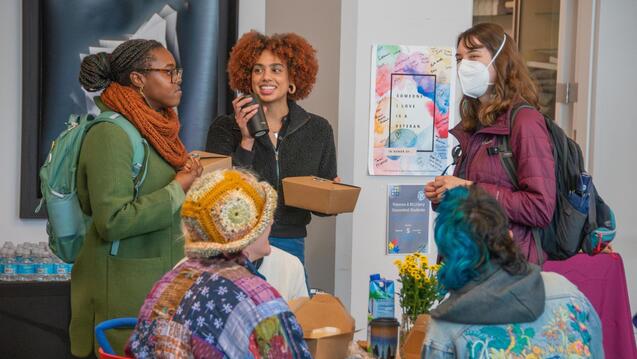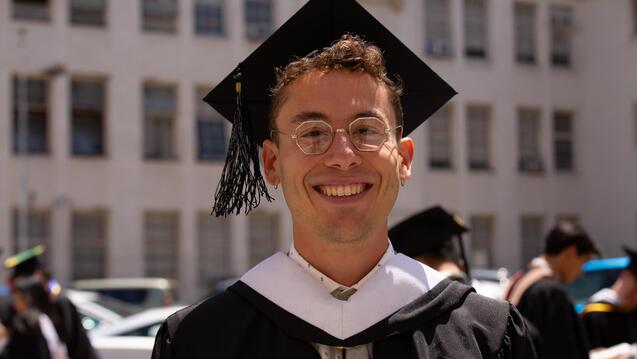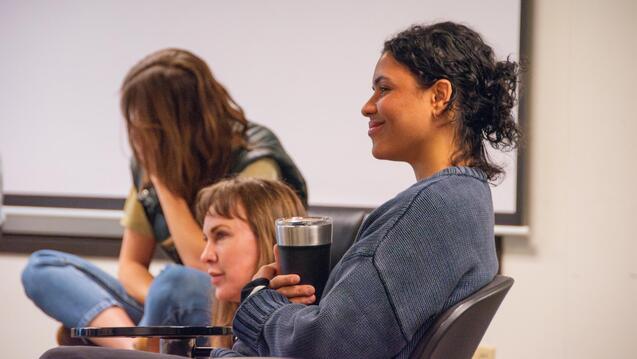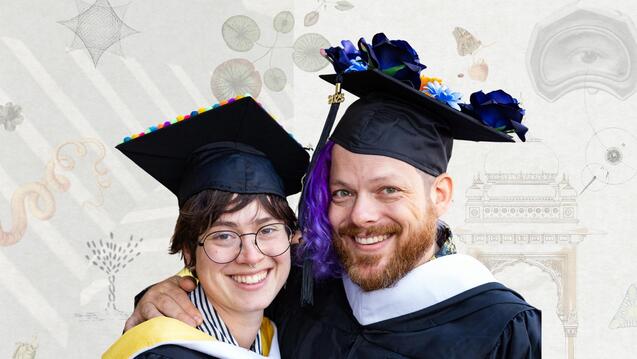
M.A.-C.P. in Integral Counseling Psychology
Join a community of therapists who incorporate the mind, body, and spirit in our three-year counseling psychology degree program.
Program Overview
Our Approach
The holistic orientation of the Integral Counseling Psychology program invites students to develop their personal vision of psychology within modern theoretical approaches. Students benefit from a spiritually-oriented, multicultural, liberatory framework for psychotherapy with individuals, groups, couples, and families.
The on-campus program offers two flexible schedules — weekday and weekend — designed for students based in the Bay Area or those who thrive in a face-to-face learning environment. The weekend option brings the benefits of our in-person courses to busy professionals needing greater flexibility.
Graduates of the on-campus program are eligible to pursue licensure as Licensed Marriage and Family Therapists (LMFTs) and Licensed Professional Clinical Counselors (LPCCs).

Clinical Skills
Developing strong clinical skills is the core of our curriculum. In addition to coursework, students engage in a year-long practicum at one of our three award-winning Integral Counseling Clinics or an external site of their choosing. Graduates of the program are able to conceptualize frameworks and appropriate interventions; diagnose, assess and make practical treatment plans; and attend to the needs and goals of the client, including being able to identify client strengths, resilience, worldview, and resources.

Diversity Awareness
The Integral Counseling Psychology program is committed to discussing multiculturalism as an essential part of psychology. We understand the fundamentally Eurocentric context within which most Western therapeutic models developed, and we explore the impact of power and privilege on those in the dominant and nondominant cultures. Students will have the opportunity to actively explore their own filters and biases, while being challenged to understand differentness and develop competencies in applying diversity sensitivity to clinical practice.

Personal Growth
A hallmark of the Integral Counseling Psychology program is significant personal growth. Through experiential and dyadic learning, collaborative discussions, and reflective papers, students combine inner experience and personal development with preparation to work as a therapist.
Career Paths
Graduates of the on-campus program are trained to become Licensed Marriage and Family Therapists (LMFTs) and Licensed Professional Clinical Counselors (LPCCs) who understand family and community systems, attachment theory, contemporary trauma theory, cultural/racial dynamics, and transpersonal concepts as a means of treating families, couples, and individuals from varying populations and demographics.
Our graduates practice in:
- Private Practice – Offering therapy to individuals, couples, and families.
- Community Mental Health Centers – Providing counseling to underserved populations.
- Hospitals and Healthcare Facilities – Working in psychiatric units, rehabilitation centers, and primary care settings.
- Schools and Universities – Supporting students through school-based counseling and college mental health services.
- Substance Abuse Treatment Centers – Helping clients recover from addiction.
- Correctional Facilities – Providing mental health services to incarcerated individuals.
- Employee Assistance Programs – Offering workplace counseling and support.
- Government Agencies and Military – Working with veterans, active-duty personnel, and their families.
- Nonprofit Organizations – Supporting specific populations, such as survivors of trauma or domestic violence.
Curriculum
The Integral Counseling program offers three formats that meet the California Board of Behavioral Sciences' LMFT and LPCC requirements to ensure you can pursue your education in the way that fits best with your life.
| Program Format | Weekday | Weekend | Hybrid |
|---|---|---|---|
| Program Duration | 3 years (7 semesters) | 3 years (7 semesters) | 3 years (7 semesters) |
| When You'll Start | Spring or Fall | Fall | Spring |
| How You'll Learn | On-campus Monday – Friday | On-campus 5 weekends each semester Friday – Sunday | Online with asynchronous and synchronous classes |
| Licensure Path | LMFT or LPCC | LMFT or LPCC | LPCC only |
| Units Earned | 60 (LMFT) or 70 (LPCC) | 60 (LMFT) or 70 (LPCC) | 66 (LPCC) |
| Program Retreat | During the semester | Early August | January |
Note: The Integral Counseling Psychology Weekday and Weekend programs meet the requirements for the LMFT and LPCC license, while the Hybrid program only meets the requirements for the LPCC license.
Rooted in a commitment to depth psychology, spirituality, and social justice, our programs offer a dynamic and immersive curriculum designed to prepare future psychotherapists with both theoretical knowledge and hands-on clinical skills. Courses blend theory-based subjects with essential learning focused on the development, cultivation, and healing potential of the therapist-client relationship.
The program’s structure moves from foundational coursework (Human Development and the Family, Multicultural Counseling, Therapeutic Communication, etc., ) to more advanced studies (Gestalt Therapy, the Clinical Relationship, Couples Counseling), leading to a year-long supervised practicum which is supported by our field placement office.
Meeting licensure requirements for multiple states, the curriculum provides the building blocks to effective psychotherapy practice, which includes developing critical consciousness, gaining practical skills, and facilitating professional excellence through experiential learning and reflective engagement. All along the way students cultivate meaningful relationships with peers and faculty, engaging in a holistic, transformative learning experience that integrates mind, heart, and practice.
Personal Therapy Requirement: Students are required to complete 50 hours of personal psychotherapy with a licensed mental health professional.
Curriculum Highlights
MCPI 5610/ICPW 5610 Therapeutic Communication (3 units) This course offers a practical, theoretical, and personal exploration of the basics of therapeutic communication from a multicultural and social-justice framework. We will explore foundational counseling skills such as deep listening and empathy, learn how to work with feelings, and examine countertransference and personal issues related to this helping profession. We will also examine related topics, such as working in the moment, presence, and intention, as well as being open to issues that emerge spontaneously in the class. The course provides an overview of key concepts and methods in therapeutic communication, integrating a variety of approaches such as psychodynamic, humanistic, transpersonal, feminist, social justice, liberation, and other psychologies. The experiential portion includes role-play and simulations.
MCPI 5602/ICPW 5602 The Clinical Relationship (3 units) The relationship between therapist and client is one of the central concerns of contemporary theories of therapeutic change. This course explores the relationship between therapist and client from the perspectives of contemporary psychoanalysis, humanism, and self-psychology. It provides various perspectives on transference and countertransference, and how to work with these dynamics in the clinical setting.
MCPI 6603/ICPW 6603 Multicultural Counseling and the Family (3 units) This course provides an overview of multicultural counseling through exploration of ethnic, social, and cultural mores and values of representative social groups and special populations. The content will focus on developing oneself as a student, therapist, and educator, who understands the complexity of human diversity—ethnicity, race, religion, sexual orientation, gender, socioeconomic class, and color. We will look at the limitations of current psychological models in addressing the particularities of our clients’ diverse familial and cultural backgrounds. You will be asked to do mindfulness practices, inquiry, and dialogue to explore experiences and cultural backgrounds to help uncover your own beliefs, unconscious assumptions, projections, countertransference, fears, and biases. The instructor will help create a safe space and offer appropriate exercises and communication tools to encourage authentic exploration and dialogue of an emotionally-charged topic.
-
Sample Course of Study (60 units)
Semester 1 | Fall
- Multicultural Counseling (3 units)
- Therapeutic Communication (3 units)
- Psychodynamics (3 units)
- Human Development and the Family (3 units)
Semester 2 | Spring- Family Dynamics (3 units)
- Clinical Relationship (3 units)
- Group Dynamics and Facilitation (3 units)
Semester 3 | Summer- Gestalt Therapy (3 units)
- Professional Ethics and Family Law (2 units)
Semester 4 | Fall- Psychopathology and Psychological Assessment (3 units)
- Couples Counseling (3 units)
- Child Therapy (2 units)
- Assessment and Treatment of Addiction Disorders (1 unit)
- General Elective (1 unit)
Semester 5 | Spring- Transpersonal Psychology (3 units)
- Trauma (3 units)
- General Elective (1 unit)
Semester 6 | Summer- Practicum (2 units)
- Cognitive Behavioral Therapy (1 unit)
- Human Sexuality (1 unit)
Semester 7 | Fall- Practicum (2 units)
- Research Methods (3 units)
- General Elective (1 unit)
Semester 8 | Spring- Practicum (2 units)
- Integrative Seminar (3 units)
-
Sample Course of Study (60 units)
Intensive 1 | Fall
- Multicultural Counseling (1 unit)
- Therapeutic Communication (2 units)
- Human Development (1 unit)
Semester 1 | Fall- Multicultural Counseling (2 units)
- Therapeutic Communication (1 unit)
- Human Development (2 units)
- Psychodynamics (3 units)
Semester 2 | Spring- Clinical Relationship (3 units)
- Group Dynamics and Facilitation (3 units)
- Professional Ethics and Family Law (2 units)
- General Elective (1 unit)
Intensive 2 | Fall- Gestalt Therapy (3 units)
Semester 3 | Fall- Family Dynamics (3 units)
- Psychopathology and Psychological Assessment (3 units)
- Child Therapy (2 units)
Semester 4 | Spring- Couples Counseling (3 units)
- Trauma (3 units)
- Community Mental Health (2 units)
- Human Sexuality (1 unit)
- General Elective (1 unit)
Semester 5 | Fall- Transpersonal Psychotherapy (3 units)
- Cognitive Behavioral Therapy (1 unit)
- Alcohol and Chemical Dependency (1 unit)
- Practicum (2 units)
- General Elective (1 unit)
Semester 6 | Spring- Integrative Seminar (3 units)
- Research Methods (3 units)
- Practicum (2 units)
Semester 7 | Summer- Practicum (2 units)
Entry Requirements
If you would like to learn more about this program, we’re here to help. Explore our program further with in-depth materials, discuss your personal and career goals at one of our open houses, or get in touch with our admissions counselors, who are ready to assist you in navigating the application process.
Required Application Materials
Your application is your opportunity to share who you are. To be considered essays and written responses must be your own authentic work.
Online Admissions Application: Begin the application process by submitting an online application and paying the nonrefundable $68 application fee.
Degree Requirement: An undergraduate degree (B.A., B.S., or the equivalent) from an accredited college or university.
Academic Prerequisites: Two undergraduate psychology courses from an accredited college or university are recommended but not required. Completion of coursework in one of the following areas is strongly recommended: human development, psychopathology, theories of personality, and/or introduction to psychology.
Minimum GPA: A GPA of 3.0 or higher in previous coursework is required. However, a GPA below 3.0 does not automatically disqualify an applicant. CIIS will consider a prospective student whose GPA is between 2.0 and 3.0. These individuals are required to submit a GPA Statement and are encouraged to contact our Admissions Team to discuss their options.
Transcripts: Official transcripts from all accredited academic institutions attended where 7 or more credits have been earned. Transcripts may be sent digitally to materials@ciis.edu or mailed to CIIS in their official, sealed envelope. Transcripts from institutions outside the U.S. or Canada require a foreign credit evaluation through World Education Services (WES). CIIS will also accept foreign credential evaluations that are in a comprehensive course-by-course format from the current members of the National Association of Credential Evaluation Services (NACES).
Admissions Essay: Your four-to-six page (typed, double-spaced) statement of intent and program readiness should include all of the following to demonstrate your goals, alignment with the Integral Counseling Psychology’s mission, and your readiness for the transformational and experiential nature of the program:
- Autobiographical content describing your personal values and meaningful life experiences that are foundational to your development and that led to your decision to apply, as well as the personal growth and learning you experienced as a result.
- Include your experiences learning about, discussing, and reflecting on identity differences throughout your life (like race, gender, ability, sexual orientation, religion, socioeconomic status, size, neurodivergence, etc.) as well as power and privilege dynamics related to identity. What kinds of emotions have you noticed yourself feeling in these kinds of conversations with others throughout your life? How have you worked with difficult emotions when they have arisen in your life?
- Include your current professional goals, objectives and experiences (i.e. volunteer or paid experience in a psychology-oriented community service agency) that demonstrate your commitment to the field of integral counseling.
Resume
Two Letters of Recommendation: Letters of recommendation will be accepted from academic advisors, professors, professional supervisors, or someone able to attest to your ability to undertake the work required for your program. Recommenders should use standard business format and include full contact information-name, email, phone number, and mailing address in the body of the letter.
Interview: Individual and group interviews by invitation from the admissions committee.
Candidate Selection
CIIS’ Integral Counseling Psychology program seeks individuals who:
- Have some background or interest in integral/East-West philosophy and psychology.
- Are pursuing a path of personal growth through yoga, meditation, personal psychotherapy, etc.
- Have demonstrated a capacity to learn and work both independently and collaboratively.
- Show a demonstrated commitment to the field, through volunteer or paid experience in a psychologically-oriented community service agency.
We encourage and embrace diversity in our program, and place a high value on having students from a variety of racial and cultural backgrounds; other representations of diversity (including age range) are also important to us. We look at each applicant holistically, and if you feel passionate about this field, we welcome your application.
Events and Info Sessions
An Online Event with Admissions Counselors Ishan McCarthy and Ronda Sharp
A Faculty- and Admissions-Led Info Session with Avery Phipps and Ishan McCarthy
Attend our in-person event on January 31 or online event on February 21.


FAQ
-
Integral counseling incorporates the entire person — mind, body, and spirit — in the understanding and treatment of mental health. Using an integral approach, therapists explore a person’s thoughts, emotions, behavior, and relational history, along with the context of their environments, communities, and the world as a whole. Integral counseling psychology alums practice using a wide variety of modern, evidence-based theories and approaches.
-
Our program is both personally and academically rigorous. We expect our graduates to have both a deeper understanding of themselves and the theories and orientations we teach. At CIIS, the education is so thorough that our alums consistently have the highest pass rates of all graduate degree programs in California for the Marriage and Family Therapist (LMFT) exam.
-
Gestalt therapy, developed by Fritz Perls, in the 1940s, is an experiential and humanistic form of therapy that was originally designed as an alternative to conventional psychoanalysis. Gestalt therapists use creative and experiential techniques to enhance awareness, freedom, and self-direction. The word gestalt comes from the German word meaning shape or form, and it references the character or essence of something. (Source)
-
The professional practice of counseling is a regulated occupation in the state of California. Coursework in the Master of Arts in Counseling Psychology program at CIIS and each of its five programs is approved by the California Board of Behavioral Sciences (BBS) to fulfill educational requirements toward the marriage and family therapist license (LMFT).
Students also have the option to take additional coursework to fulfill the educational requirements of the professional clinical counselor license (LPCC). Students seeking the LPCC license also take courses for the LMFT, enabling them to pursue either license and to work with couples, families, and/or children as an LPCC. Students seeking licensure in California as an LMFT or LPCC must register with the BBS after graduation and successfully complete additional post-graduate supervised clinical associate hours and written examinations. See the BBS’ Statutes and Regulations for additional information.
-
In many cases, our coursework and training is very similar or entirely portable to many states. However, each state has their own specific licensure requirements that include both academic coursework and clinical practicum hours that may differ from California’s requirements.
In cases where this program does not meet the requirements for another state, additional coursework or practicum hours may be required. While licensure may be possible in another state, it is not guaranteed. Luckily, you will have the full support of the Director of the Master's in Counseling Psychology who will help you understand the specific licensing requirements.
Lastly, you should consult the licensing boards of the appropriate state of country for the most up-to-date licensing information outside of California.

Take the Next Step
For over 50 years, CIIS has been at the forefront of education that integrates rigorous science, innovative scholarship, and social justice. You will learn from faculty at the forefront of their fields, local artists and activists, and a community of peers as passionate and dedicated as you. There’s never been a better time to be here – let’s build a healthier and more equitable world.




